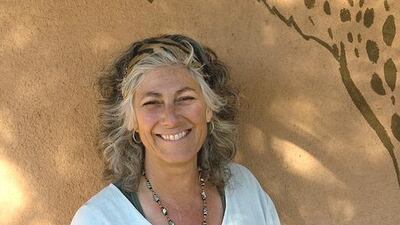One of the world’s top cheetah experts has called for a nationwide programme to collect DNA samples to save the species from extinction.
Dr Laurie Marker, founder and executive director of the Cheetah Conservation Fund, recently arrived in the UAE to advise local zoos and wildlife centres on preserving genetic diversity.
While here, she will meet wildlife officials and veterinarians in Al Ain and Sharjah, following on from a visit in May last year.
Dr Marker has been accompanied by the fund’s veterinarian and geneticist, Dr Anne Schmidt-Kuentzel, and cheetah keeper and research assistant, Ryan Sucaet.
She is making the case for setting up a genome resource bank, where semen samples from male cheetahs in captivity can be stored and used for breeding programmes.
Collecting and storing the samples “is very important because it saves the genetic material”, Dr Marker said.
“Many of the facilities are doing it on their birds of prey or their rare antelopes, but the large carnivores are not being done so we are trying to help teach them how to do this,” she said.
With about 10,000 remaining in the wild and 1,600 living in captivity, the cheetah “is really vulnerable to extinction in a very short period of time”, Dr Marker said.
Storing genetic material may be even more important for the cheetah, which exhibits less genetic diversity than other mammals.
“Genetic diversity is really crucial for the survival of the species and if you have low diversity you cannot adapt to changes in the environment, to changes in infectious pressure, so therefore it is something that does put the species at risk,” said Dr Schmidt-Kuentzel.
Increasing pressure on the world’s remaining wild cheetah population are exacerbating the problem, she said.
“If you reduce the number of individuals, you will lose diversity but, if you increase the numbers again, it won’t increase the diversity,” Dr Schmidt-Kuentzel said.
“It is something that is irreversible in our lifetime. It would need thousands of years for it to come back.”
On Wednesday the team addressed a meeting in Al Ain, hosted by the management of nature conservation at the Department of President’s Affairs.
On Monday they are attending a seminar at the Al Bustan Zoological Centre in Sharjah, where three male cheetahs will be anaesthetised and the team will demonstrate how the semen can be collected and frozen in liquid nitrogen.
Based in Namibia, the Cheetah Conservation Fund already stores more than 300 samples and maintains the international cheetah stud book used to plan captive breeding programmes.
Dr Marker will meet veterinarians to discuss how best to reach those who keep cheetahs as pets.
Taking cheetahs from the wild is illegal but some are still shipped to the UAE where they are often kept in unsuitable conditions.
“Very few cheetahs that are in captivity here make it over two years of age and it is horrible,” said Dr Marker.
One important issue is diet, with animals often fed raw chicken or dry pellets that are not enough to give them the vitamins and minerals they need.
“They are not being fed calcium and vitamins, which means that their bones are not healthy, and they will not be able to reproduce if they do not have the right nutrition,” she said, adding that neurological diseases can be another result of poor diet.
Dr Marker said the team would distribute posters on cheetah health as a way to reach private owners.
“We really need the private owners to become engaged,” she said. “People here love the cheetah and I would love them to be engaged in saving the species.
“If they love it, please help it.”
vtodorova@thenational.ae

